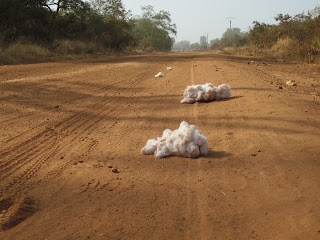I know. I’ve been a bad blogger. However, that does not mean that I have been curled up in my house in a depressed lump, or decided to give up all electronics, or, perhaps, forgotten how to speak the English language. Rather, I’ve just been incredibly busy, preferring to lie prone on workstation couches when in range of internet instead of pecking away at my laptop. I still love you. I’m just lazy.
Six months have passed now at post, and each month has brought with it new challenges, pitfalls, and accomplishments. That may seem cliché, but the emotional rollercoaster that Peace Corps Volunteers ride can be compared to no other. Learning how to deal with failure has been an absolutely profound challenge, as has been the lack of respect for scheduled meetings. This, however, makes the successes that much more wonderful. I no longer stand tentatively at my door, anxiously garnering the nerve to step outside of my house and immerse myself into Benin (a common phenomenon among new volunteers). Rather, I have boldly dined upon frog (like chicken), danced alone for large groups of spectators (not pretty), and determined that magical amount of sass needed to navigate Beninese life as a white person (a lot).
As intimated,a long with this experience and confidence have come work related challenges. How, for example, can I be effective when my work partners live six miles away? Or if I can’t speak the local language in a village where few know French? Or if problems of “access” for the villagers seem insurmountable? Indeed, often I feel as if I’ve found a solution to a local problem, only to look a little further along the line to see that the problem is inextricably knotted to another “lack”, and then to another. What looked like a very manageable section of rope from afar is actually, upon much closer inspection, a tightly tangled mess. Compost is the perfect example. It is probably even a development worker’s dream solution, and they see the problem as that very manageable and tangible section of rope: one can sit in their office from abroad, note that the female gardeners of Benin face decreasing soil fertility, observe that the women don’t use compost, and boldly declare, “Compost is the solution!” In many cases, they are right. But what if, like in my village, the garden is just too far away to transport food or animal waste? Or if there is barely enough water to water the gardens, never mind a compost pile? Or that the garden becomes someone else’s rice paddy during the wet season? Ugh. Although challenging, it has been eye-opening to see the realities of “producing change” and the complicated interface of development work on the ground level.
But six months also means that I’m getting some meaningful projects off of the ground. Thank God. It feels wonderful to have a little bit of direction. Some of the bigger projects I’ve been working on:
Seed Bank and Conservation Initiative – Giving presentations to my five gardening cooperatives on how to conserve seeds, and then initiating a seed bank in each village. Gardeners can take seeds from the bank for free, but at the end of the season they must return double the amount that they took. Free seeds should therefore always be available. Hopefully this will ameliorate what seems to be a constant seed crisis.
Fruit and Vegetable Drying – I’m in the process of having a solar food dryer built (read: a wooden box covered with mosquito nets). The women of my village’s cooperative will dry mangoes with this, increasing the availability of fruit during the off-season and make a little money through a value-added enterprise J . Besides, who doesn’t like dried mango?
“How to Garden” Posters for the Illiterate – My art project! I get to sit in my house, listen to music, and draw vegetables. My posters describe, in a way which people who can’t read letters or numbers will understand, how to cultivate seven of the most popular vegetables. One is going to each of the gardening groups in my commune (20+).
Demonstration Plot – This has been a wonderful opportunity for villagers to watch me wrestling with my African hoe, or literally beating the earth with a stick, and say “Oh look, Ganegui! Look at that white girl trying to garden! How cute!” We have four new vegetables growing in their own plots to introduce a little bit of variety. We are also keeping accounting books for each of them to look at the financial feasibility of these vegetables and provide a basis for basic illiterate accounting skills.
Anyways, I’d like to give a shout out to everyone who has sent me letters and packages- You guys are absolutely wonderful J . When having a rough day, nothing is better than to sit down and look at a card from home. I hope everyone is well, and keep me updated on your lives! I will get better about responding to letters and packages, I swear.

